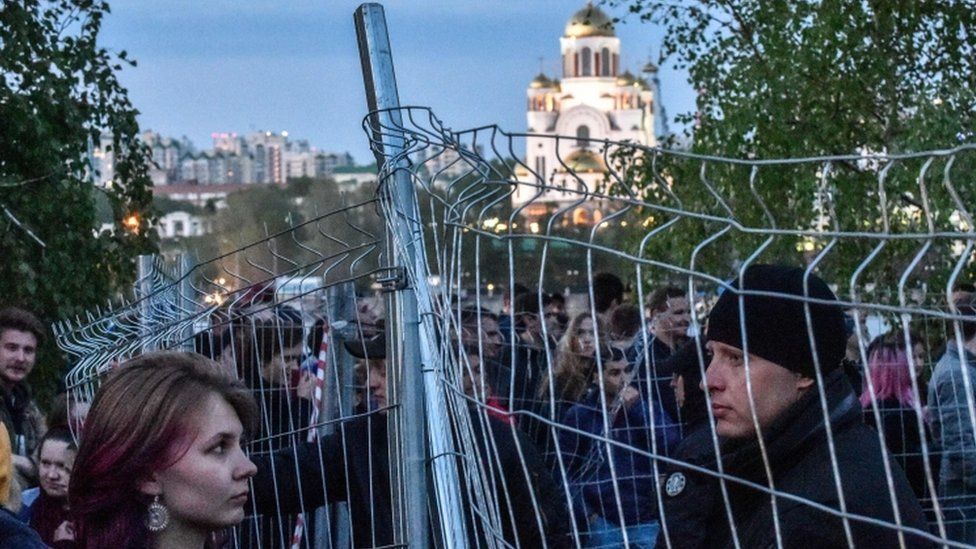Russian city of Yekaterinburg rejects plan to build church in park
- Published

Residents of Russia's fourth-largest city, Yekaterinburg, have rejected plans to build a church in a popular park, ending a week of unrest.
The governor of the surrounding region, Sverdlovsk, said the church would not be built as a result of a survey conducted by an opinion pollster.
The VTsIOM poll found 58% did not want St Catherine's Cathedral in the park.
"This conflict is over, it's been exhausted," the governor, Yevgeny Kuyvashev, wrote in an Instagram post.
Allow Instagram content?
This article contains content provided by Instagram. We ask for your permission before anything is loaded, as they may be using cookies and other technologies. You may want to read Meta’s Instagram cookie policy, external and privacy policy, external before accepting. To view this content choose ‘accept and continue’.
Plans to build the church on the park square were met with anger and days of protests by residents.
Opponents said the cathedral would have destroyed one of the few green spaces in the city in the Urals.
The Russian Orthodox Church says it needs new churches to replace the many buildings destroyed under Soviet anti-religion laws.
Last week, around 2,000 people descended on the square to protest against the church's construction, leading to dozens of arrests.
Protesters celebrate the earlier decision to put the church on hold after President Putin called for a vote
In response to demonstrations, President Vladimir Putin said a poll should be conducted to "find the optimal solution for those who live there".
On Wednesday, Mr Kuyvashev confirmed the church would be built elsewhere. He said the poll gave "grounds to exclude the garden near the Drama Theatre from the list of potential sites for placing St Catherine's Cathedral".
What are the results of the poll?
The poll, conducted by the All-Russian Public Opinion Research Center (VTsIOM), asked 3,000 residents their opinions about the cathedral project.
While a majority (58%) opposed plans to build it on the park, only 18% of respondents wanted the project to be scrapped completely.
Only 7% wanted the project to continue unchanged.
In response to another question, 74% described the planned location as "mostly inappropriate", while only 10% called it "mostly appropriate".
The results of more polls are expected to be released. Deputy Mayor Yekaterina Kuzemka told the Interfax-Ural news agency that city officials and regional authorities would carry out separate polls.
Why are people against the church?
The church has been a source of controversy since plans to build it were first announced in 2010.
On its website the local activist group in Yekaterinburg says: "To build the cathedral they want to destroy the park, which is a favourite place for residents to relax."
Others have said that the city is in need of more, not fewer, parks.
"Nobody is against a church, but everyone is against building one here," one protester told Radio Free Europe. "There are lots of churches here... But not much green space is left in the city."
Protesters also chanted "we want to see the mayor" - referring to the city's former Mayor, Yevgeny Roizman, one of the few politicians in office who had been openly critical of President Putin.
Mr Roizman resigned last year after it was announced that direct mayoral elections were being scrapped in Yekaterinburg, and attacked the decision as anti-democratic.
What has the Church said?
Vakhtang Kipshidze, a spokesman for the Russian Orthodox Church, has accused protesters of being "anti-religious".
"There are a multitude of lawful ways of expressing disagreement... but to create conflict on religious grounds is especially sad on the soil of Yekaterinburg, where not so long ago by historical standards mass religious persecution took place and Tsar Nicholas II and his young children were murdered," he told Interfax.
He added that protests "could only have been organised by people driven by anti-religious motives".
Representatives from the Church have taken part in closed-door meetings with activists.
Mr Kipshidze said that while the Church was in favour of constructive dialogue with the protesters, these discussions should not include people who "simply cannot tolerate anything connected to religion".
- Published3 May 2019
- Published7 May 2019
- Published28 October 2013